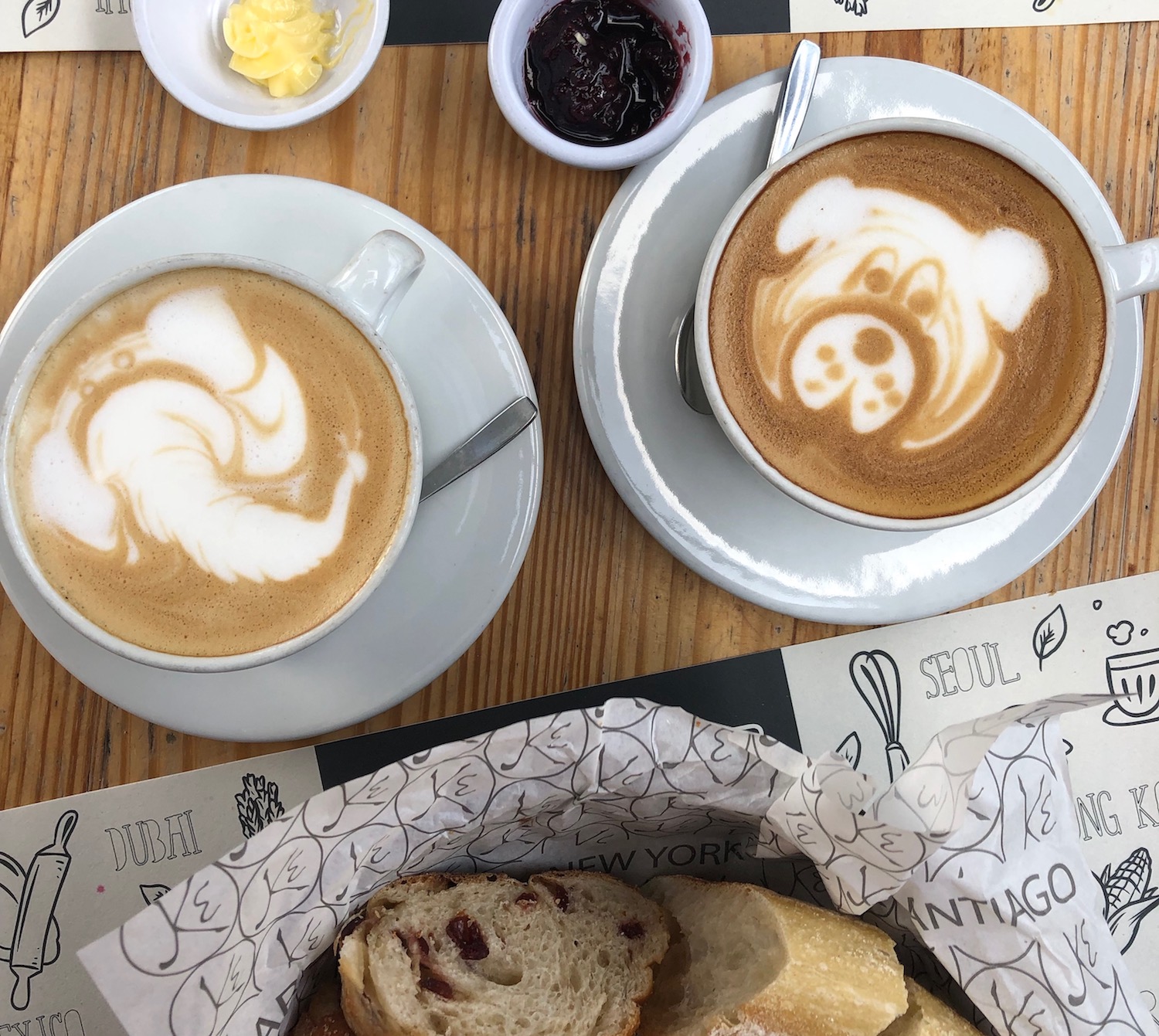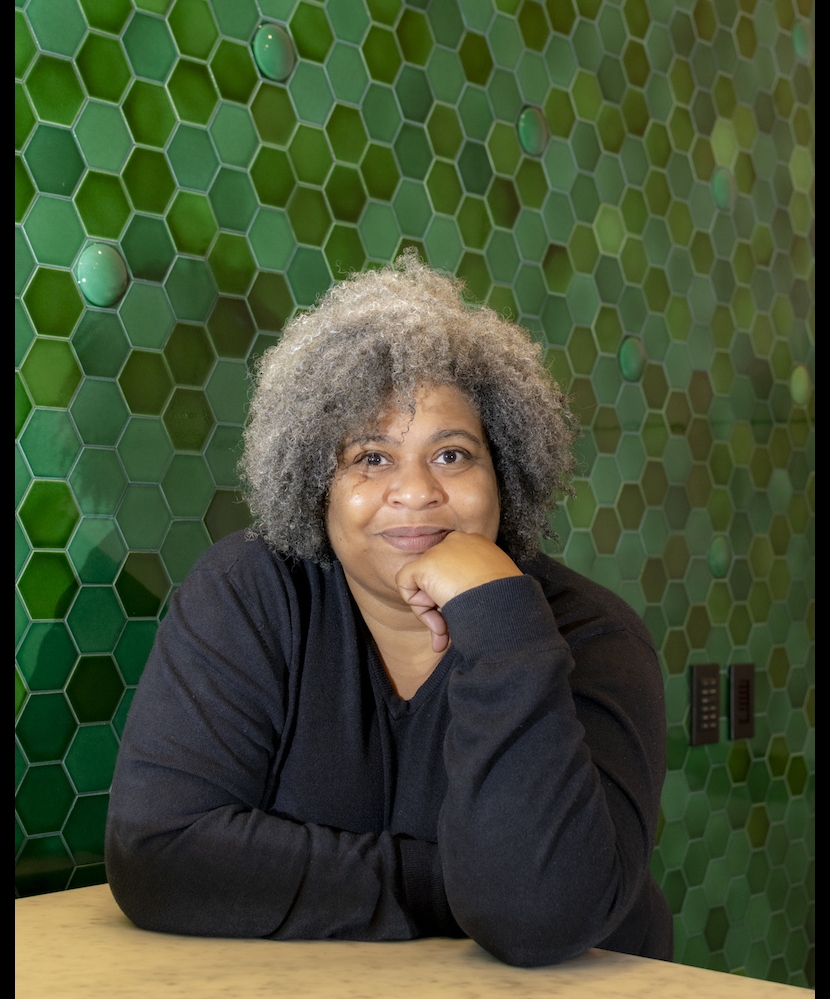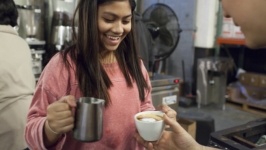Q&A: Coffee Connoisseur Candice Madison Talks Determination, Fair Wages for Farmers, and How to Find Your Perfect Cup
Candice Madison remembers being introduced to coffee the same way some of us were: as a desperate attempt to stay awake studying for exams, laden with cream and sugar to try and offset the unfamiliar bitter bite. But while others simply upgraded to a latte at the local cafe or knowing their preference for Arabica or Robusta beans at the supermarket, Madison has instead paved a far-reaching career path within the coffee industry.
A U.K. native, she’s spent the past 10 years working in a wide variety of roles in coffee all over the world. Madison started as a barista, then became a roaster, and has judged countless World Coffee Event Barista Championships, in the U.K. first and then around the globe. She passed her Q Grader Certification—a three-day long, extremely complex exam by the Coffee Quality Institute that proves coffee industry expertise (think of a sommelier for wine)—on her first try, and then was personally invited to be a Q Instructor (there are less than 40 worldwide) which she has done for the past four years.
She’s lived in Astoria (in between travels) the last five years, and we sat down with her at one of her local favorites—Kinship Coffee—to learn more about what fascinated her about the drink, her wide range of experiences within the industry, and the causes she holds most dear.
Being from the U.K., I imagine tea was your hot drink of choice growing up. When were you first introduced to coffee and what was the coffee scene like at that time? What fascinated you about it enough to learn more and pursue it?
Well, I was studying for exams and my mum had a variation of the Mr. Coffee thing, so she got me rubbish coffee and I didn’t know any better so I just stayed awake studying! And then about 2008/2009 I got a job in a local coffee shop in London called Progreso. One day my manager walked in and just looked at me and said “Your milk is too hot.” I was shocked, like, “how do you know this, Jedi master?” And he said “Because I can hear it” and that was it—I was hooked. I thought, “What? That’s insane.”
When Progreso ended up closing, I knew I wanted to keep working in coffee, mainly because of a trip I took to visit a friend in Australia. There was a 7/11 at the top of the road, and I was tired and wanted a coffee, but it came with perfectly done latte art, perfectly extracted espresso...and then I realized in Melbourne that was the lowest bar. The coffee was just so amazing everywhere I went.
In London at the time there were only 16 specialty coffee shops that were actually doing proper coffee—that means purchasing specialty beans, roasting them and pairing them properly with milk and proportion sizes. This was not a thing in England at the time. I believe it was barely a thing in America.
I realized I had to go further back in the chain in order to affect coffee the way I wanted to. By the time it gets to the barista, it’s already been picked by the green importer, chosen by the roaster, roasted to the roaster’s flavor profile, and then I, as the barista, can only make a tiny amount of change.
You worked in many parts of the industry—as a barista, as a roaster (which I know was almost self-taught for you) to judging barista competitions. How did each of those experiences contribute to your craft?
After I realized I wanted to roast coffee, I applied to the only job available for an apprentice roaster and thought, “great, I’ll learn how to roast and all the things about the beans”...and no, that did not happen. I was hired to take the job of the person I was supposed to learn under (I didn’t know this but he did), so he locked himself in his office all day and never cupped with me [a process to taste and analyze coffee that involves pouring hot water over ground beans and slurping: aspirating to spray the coffee over your whole mouth (you have taste receptors everywhere!)]. It was a good thing in a sense because it made me talk to a lot of people and read widely. It made me have to taste, understand and learn where I was going wrong.
As a judge, which I did with World Coffee Events (WCE), it was just incredibly informative and mind-blowing. It introduced me to how huge this world of coffee was. It taught me a lot about the industry, the areas I wanted to explore, and just how to be a better coffee professional. And also the networking...you meet people from all around the world and every country has its own coffee culture and that to me is really fascinating as well. The further I get into coffee the more interested I am in coffee as it impacts people—to me they’re not separate.
Something most people don’t realize is what a complex and difficult process coffee production is. Can you tell me more about the quality patrons now demand and finding ethically-sourced coffee that empowers producers rather than exploits them?
The traditional supply chain is still pretty exploitative. I’m actually on the Equity, Diversity & Inclusion Task Force for the Specialty Coffee Association (SCA). We had a global meeting in Madrid and as an ice breaker they asked, “what word would you use to describe coffee in 2019?” and I said “neo-colonialist” because the supply chain is still the same as its always been for the most part.
There are still black and brown people in countries making very little money and there are still people in consuming countries demanding that their coffee be cheaper. And I don’t know how much cheaper it could be—it’s like going into Tiffany’s and saying “I would like that flawless diamond ring for $5 please.” You wouldn’t do that. But the way that coffee has been introduced to most people culturally is as a commodity product first. So no one was demanding quality at first—they were just expecting something brown and hot...
If you want bodega coffee, that’s great for you--terrible probably for the people trying to make money--but it’s great for you because it’s a $2 cup of coffee. But it’s probably not processed the best, not sorted properly...not as much has been invested in that coffee. So of course it can be cheaper, because the labor going into it is much less intensive. But if you want specialty coffee, like from a café, that is graded all the way through. Specialty coffee starts at the farm level. Farmers harvest those beans or cherries when they’re ripe, make sure they’re sorted properly by the pickers, processed, fermented and dried evenly. The beans are then graded again and again and again by farmers, the exporter, the importer, the roasters.
You received your Q Grader Certification in 2011. Tell me about what that signified for you and others in the industry?
For me it was more, “that’s nice, that’s cool,” because I didn't really have any expectations because I was so new. For other people, it’s seen as a badge of accomplishment.
The Q Grade system was originally for coffee, not for graders, so the original system is two-fold. For the coffee, if it’s graded as “speciality” the farmer can charge a premium. The thing is, if you don't train people to be very very calibrated, very very on-point, in my mind, you do the farmer and producer a disservice. You need people to have an objective ability to assess their coffee properly so they’re getting a correct assessment—it affects [the farmers’] livelihood.
What would you say to people who are intimidated by coffee and want to start learning more and figure out what they like?
I think one of the worst things you can do is tell people what they like or don’t like. Go to different shops. Maybe try a subscription service that sends you different beans, and you can learn to make it for yourself, so you’re not always at the whim of other people. Also just drink coffee and pay attention. What do you finish and not finish?
And overall, drink what you like. If you want a huge iced latte, then get a huge iced latte. If you want to use oak milk or soy milk and a whole bunch of sugar—do it! I don’t care. And you know why? Because it means coffee is getting sold, and farmers are getting paid. So I can tell you the ways I think it'd be really nice for you to experience coffee, but ultimately I just want you to buy it and drink it and like it.
This interview has been edited and condensed for clarity.







